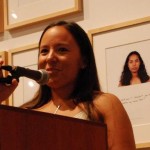
“Challenger” by Noriko Nakada
It’s a cold Tuesday morning in Mrs. Gregory’s class. I watch the clock and count the seconds to break at 10:00. I’d hoped we’d get to watch the Space Shuttle launch, but instead we’re writing about what the teacher aboard the Challenger today should teach her students when she gets back from outer space. I wonder how Christie McCullough was chosen to fly into space instead of Mrs. Gregory.
I write about how she should describe the experience of floating in zero gravity and Mrs. Gregory steps out into the hall. When she comes back in her hands shake. The tissue she keeps stuffed up her sleeve trembles as she shields her face and she mumbles, “They’re gone. The Space Shuttle exploded.”
I let out a laugh. Maybe it’s because I’m not sure how to react to Mrs. Gregory’s shaking and tears but I glance around the classroom and correct myself immediately. My laughter was all wrong. I cover my mouth and feign shock because my classmates look so confused and concerned. Their responses are all appropriate and I don’t know what in the world made me laugh. What I do know is that my response wasn’t right.
It’s all over the news and the nation mourns and I try to justify my response. I have the math of tens of thousands killed in Hiroshima and Nagasaki in my mind. I have images of priests, nuns and the disappeared killed by Salvadoran death squads and piled in open graves. These numbers and images overwhelm the seven aboard the doomed Space Shuttle. The Cold War, the nuclear arms race and the devastation of my brother’s battle with voices seem more real than white streaks falling through a cold winter sky.
But if I think about the families of the seven astronauts aboard the Challenger I start to feel a sense of grief. If I remember back to when Chet’s best friend died and it felt like our whole house was underwater, or when Bethy Hurley lost her fight with leukemia and all of the color washed out of her family’s faces, if I think of Auntie Hannah and her family and then think of all the families those astronauts left behind sitting at home where it’s too quiet and no one knows what to say, then I can make my reaction match everyone else. I’m sad and when people talk about it I say, “It’s so awful. I can’t believe it.” I calibrate my response to match everyone else’s and I don’t mention to anyone that when I first heard about the Space Shuttle Challenger, I laughed.
+

Noriko Nakada writes, blogs, tweets, teaches, and continues to use the Oxford Comma in Los Angeles. She is also the author of Through Eyes Like Mine, a memoir about of growing up multiracial in Bend, Oregon.
I was in Kindergarten when the Challenger disaster happened, and I laughed initially thinking it was some sort of cool Star Wars thing. It felt eerie reading this. Good job.
I was in tenth grade and had a crush on an American girl in my class named Holly. I told her it was okay and then we talked for a bit.
I really enjoyed this.
I enjoy the child’s voice in fiction very much. Thank you.
How about in nonfiction, Kima?
This is a great story. Sometimes I laugh too when I am uncomfortable.
Boy, we learn to conform at an early age! This excerpt reminds me of when the gps says “recalculating” whenever you go a different way. It seems to me you focused less on the inappropriateness of the laugh and more on how we end up becoming disingenuous bots; how we feel the need to “(re)calibrate(d)” our responses to reflect what’s acceptable-based on what everyone else is doing. The laugh was an emotion too. A valid and misunderstood one.
*(re)calibrate
I don’t think it’s wrong to have laughed, people often laugh when nervous, I do, and at the most inappropriate moments! 🙂 Also, the way the news was delivered was raw and unexpected: who’s to say that you child-brain didn’t know if it was some elaborate adult joke? The teacher’s behaviour was bizarre in itself, perhaps like something out of a (comedy) film. The fact that you were unsure already shows that your spontaneity had been affected by the world around you. Whatever the reason, you were a child, you can’t be blamed for any of what happened. One of the things your story shows, is that you haven’t lost your humanity – because you can still connect with the grief of strangers you know have lost someone. Long may that continue. 🙂
Love hearing people’s recollections of this moment. I don’t think you’re alone in thinking Star Wars…
Seems to happen early and often, huh Talisha. And then we are stuck trying to figure out what our “real” response it.
Thanks for reading!